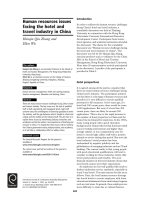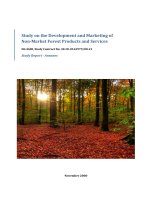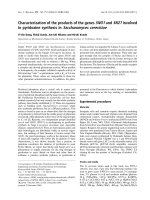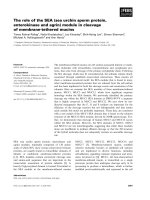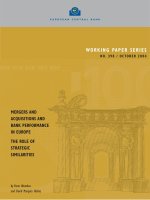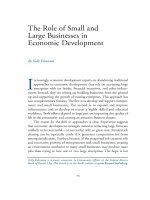The role of souvenir products and travel gifts in the development of sustainable tourism in Vietnam
Bạn đang xem bản rút gọn của tài liệu. Xem và tải ngay bản đầy đủ của tài liệu tại đây (290.26 KB, 11 trang )
178
TRƯỜNG ĐẠI HỌC THỦ ĐÔ HÀ NỘI
THE ROLE OF SOUVENIR PRODUCTS AND TRAVEL GIFTS IN THE
DEVELOPMENT OF SUSTAINABLE TOURISM IN VIETNAM
Pham Thi Bich Thuy
Hanoi Metropolitan University
Abstract: Tourism is emerging as one of the potential economic industries in many
countries around the world. In Vietnam, promoting tourism images are questioned with
many issues such as the ideas, the content, the methods, etc. for the development.
Designing and advertising local souvenirs and travel gifts are the effective methods to
promote tourism images in many countries and also in Vietnam. In this article, we point
out the role of souvenirs and travel gifts on the sustainable tourism development in
Vietnam. In addition, we show experiences on the developing travel-gift products of some
countries around the world and raising the reality of Vietnam in the design of souvenir
products and travel gifts. The research results contribute to a specific perspective on
promoting the image of Vietnam tourism through the designing of souvenir products and
special tourist gifts.
Keywords: Souvenir product, travel gift, tourism, Vietnam.
Email:
Received 14 September 2018
Accepted for publication 10 October 2018
1. INTRODUCTION
Today, tourism has become a real need for variety of social strata and tourism which is
considered as a free-market economy, bringing significant socio-economic benefits to all
countries. In fact, many countries and territories such as Greece, South Africa, Africa, etc.
have considered tourism as one of the most effective solutions in the modern economy
crisis. In Vietnam, in the last five years, when most industries are plagued by prolonged
crisis, tourism is still regarded as the bright spot of the economy.
In 2016, tourism in Vietnam has achieved some express goals, with over 10 million
international visitors, up 26% over 2015 and doubled compared to 2010, the total incoming
from tourists reached VND 417,000 billion. In the first seven months of 2017, the number
of international visitors to Vietnam reached 7.25 million increased by 28.8% over the same
period. Total revenue from tourists reached nearly VND 307 trillion, an increase of more
than 26% over the same period of 2016 [12]. This achievement is significant in the context
179
TẠP CHÍ KHOA HỌC SỐ 26/2018
of the domestic economy is bleak but. In comparison with the current potential of the
industry, tourism is still low. Many localities and destinations across the country have not
been exploited to match their potential.
According to the WEF in Travel and Tourism Competitiveness Report 2017,
Vietnam's competitiveness index ranked 67/136 of the economies (rising by eight places).
Vietnam's strongest point is the cultural and tourism resources (30th), natural resources
(34th), price competitiveness (35th), human resources and labour market (37th, up to 18
places) [11]. Security and safety perception (57th) is also showing Vietnam is an
increasingly attractive destination. However, many of Vietnam's indicators are ranked
lowly such as: Environmental sustainability (129th), quality of tourism infrastructure
(113rd), priority for tourism (101st), Government for tourism (114th) etc.
Colors are determined by the relative position of each score in the global distribution
of each pillar, taken individually.
Table 1. The Travel & Tourism Competitiveness Index 2017: Asia and the Pacific [9]
T&T policy and enabling conditions
Country/
Economy
Prioritizationof
T&T
EnvironInternaPrice
mental
tional Competitive
SustainaOpenness
ness
bility
Natural and
cultural resources
Infrastructure
Cultural
Ground
Air
Tourist
Resources
Transport and port
Service
Natural
&
Infrastruc- infrastruc- Infrastruc- Resources
Business
ture
ture
ture
Travel
EASTERN ASIA AND PACIFIC
Japan
5.4
4.4
4.6
4.4
4.6
5.4
5.3
4.3
6.5
Australia
5.1
4.8
3.8
4.5
5.7
3.6
6.1
5.2
5.0
Hong
Kong
SAR
5.8
3.9
4.2
4.3
5.5
6.4
4.4
3.5
3.0
China
4.8
3.0
5.3
3.2
4.3
4.0
3.2
5.3
6.9
New
Zealand
5.6
4.5
4.4
4.7
4.7
3.7
5.7
4.5
2.3
Korea,
Rep.
4.6
4.3
4.7
4.2
4.3
5.0
4.6
2.3
4.9
Taiwan,
China
4.7
4.2
5.2
4.1
3.5
5.2
4.5
3.4
3.2
Mongolia
4.0
1.9
5.7
3.4
2.2
2.1
2.7
2.7
1.8
Eastern
Asia and
Pacific
Average
5.0
3.9
4.7
4.1
4.4
4.4
4.6
3.9
4.2
180
TRƯỜNG ĐẠI HỌC THỦ ĐÔ HÀ NỘI
T&T policy and enabling conditions
Country/
Economy
Prioritizationof
T&T
EnvironInternaPrice
mental
tional Competitive
SustainaOpenness
ness
bility
Natural and
cultural resources
Infrastructure
Cultural
Ground
Air
Tourist
Resources
Transport and port
Service
Natural
&
Infrastruc- infrastruc- Infrastruc- Resources
Business
ture
ture
ture
Travel
SOUTH-EAST ASIA
Singapore
6.0
5.2
4.7
4.3
5.3
6.3
5.4
2.4
3.1
Malaysia
4.7
4.1
6.1
3.5
4.5
4.4
4.7
4.1
2.9
Thailand
5.0
3.8
5.6
3.6
4.6
3.1
5.8
4.9
2.8
Indonesia
5.6
4.3
6.0
3.2
3.8
3.2
3.1
4.7
3.3
Sri Lanka
5.2
3.1
5.6
3.9
2.6
3.9
3.2
4.1
1.6
Vietnam
4.0
3.0
5.3
3.4
2.8
3.1
2.6
4.0
3.0
Philippines
4.8
3.4
5.5
3.6
2.7
2.5
3.4
4.0
1.9
Lao PDR
4.7
3.0
5.7
3.8
2.1
2.4
3.5
3.0
1.3
Cambodia
5.1
3.5
5.1
3.3
2.1
2.4
2.9
3.2
1.6
SouthEast Asia
Average
5.0
3.7
5.5
3.6
3.4
3.5
3.9
3.8
2.4
SOUTH ASIA
India
3.9
3.7
5.8
3.1
3.9
4.5
2.7
4.4
5.3
Bhutan
5.0
2.9
6.0
4.6
2.7
2.5
2.7
3.5
1.3
Nepal
4.8
2.8
5.6
3.4
2.0
1.9
2.3
4.2
1.3
Pakistan
3.4
2.2
5.4
3.1
2.1
3.0
2.3
2.2
1.9
Bangladesh
3.2
2.5
4.7
3.4
1.9
3.1
1.9
2.4
1.6
South
Asia
Average
4.1
2.8
5.5
3.5
2.5
3.0
2.4
3.3
2.3
As compared with those in the ASEAN countries, in 2016 Vietnam spent only about
2.5 million USD to promote national tourism destinations meanwhile Thailand, Singapore
and Malaysia spend about 100 million USD for this activity. Malaysia has 35
representative offices abroad, Thailand 28 offices, and Singapore 23 offices. There has
been any abroad-representative office of Vietnam found.
Thus, to develop tourism sustainably, an urgent and important issue today is to
introduce and promote Vietnam to the world. There are many approaches to perform this
task. In fact, many countries promote culture and build the image of the country in many
areas (such as promotion, economy, society...) by selling souvenir gifts. When visiting a
TẠP CHÍ KHOA HỌC SỐ 26/2018
181
place, visitors desire to have local products as gifts for the trip. Indirectly, they introduce
the local culture of where they visited. Therefore, souvenirs and travel gifts are one of the
factors that contribute in the attractiveness of destinations, in visitor retention, in spending
incentives and in the effective creation of tourism image in every country.
2. CONTENT
2.1. The role of souvenirs and travel gifts for tourism development
The souvenirs and the gifts of tourism, always bring with it the message typical of
culture, spirit, custom of the place of production. Visitors will understand the land, people
of that region through these gifts.
Souvenirs, travel gifts also remind people of their own memories and make the
recipients remembering the person who gave them the gift and remembering the feelings
they have for each other.
Through these gifts, people also know the image, symbol, brand of a business, a
locality, or even a nation. Therefore, souvenirs and travel gifts play a very important role in
propagating, promoting image and tourism potential of destination.
According to S. M. Baker et al. (2006), when visitors come to a place, they are likely
to seek tangible reminders of their interactions with that place. Travelers want to "put their
hands" on things that give them real travel experiences and prove their appearances there.
As a matter of fact, the gift product specifies or actualizes things that otherwise are
invisible. Thus, the role of souvenir products is to capture the essence of the special
experience and bring the sacred qualities that visitors visit back to their home.
In other words, the souvenir is a thumbnail, a memory of the destination, which plays
a very important role in the journey of each visitor. The development of destinationspecific souvenirs is to contribute to the development and promotion of destination images
in the heart of visitors.
2.2. Experience on designing souvenirs and travel gifts in countries around the
world
The world has long been interested in the role of souvenirs, travel gifts associated with
tourism development and offers solutions to develop these products in a unique,
outstanding and unique way. For example, when coming to Russia - the land of Aries,
certainly tourists desire to bring back Matreshka dolls. Feeling a flip open a shell to see
another smaller doll inside makes the owner feel curious. Or the lustrous black lacquer
182
TRƯỜNG ĐẠI HỌC THỦ ĐÔ HÀ NỘI
trays with colorful flowers are characteristic of Zhostovo, the small village on suburb of
Moscow.
In Singapore, a new island foundation nation, Merlion Sea Lion is a known-favorite
symbol.
Japan is famous for Maneki Neko cat. This waving cat symbolizes good luck. So most
shops and offices in Japan own cats. This is a gift often purchased by visitors as gifts in the
hope of bringing good luck. In addition, other items are popular with the likes of the
Samurai sword for self-confidence, Japanese pride or Daruma dolls - a symbol that brings
prosperity, luck and strength.
Korea is a country that has created a strong brand in developing souvenirs, travel gifts
for a wide range of products, crystallizing both traditional values and modern values of
science and technology. The traditional products of Korea can be referred such as ginseng,
mushroom lichen, seaweed etc. This is known as the “country of ginseng”. So it is no
wonder that visitors to Korea always choose ginseng as a precious travel gift. The
Harubang statue is the symbol of Jeju Island or the stamp (Dojang). Previously, seals in
Korea were used quite commonly in ancient official documents. Today, the stamps are
introduced to tourists as interesting souvenirs. In addition to classic products, Korea is
known as a high-tech country in the world. There are also products of crystallization of
technology and wisdom, great for the whole world. Visitors to the land of kimchi are also
extremely interested in electronics such as computers, smart phones, cameras... of famous
brands such as Samsung, LG... Korean cosmetics, a wide range of products naturally made,
is also one of the most cosmetics in the world. In addition, Korean fashion is also an
extremely popular choice of young people with the Hanllyu wave which has been
introduced in many countries, many regions in the world.
2.3. Actual development on souvenirs and travel gifts in Vietnam
Product design is poor, less cultural imprint
According to a survey by the tourism industry in 2010 to the average cost of travel to
Vietnam, international tourists spend only about 10-15% for shopping, while Thailand
collects up to 50 -55% [10]. In 2014, the spending on the purchase of goods and souvenirs
of international visitors to Vietnam has increased to 18.34% [11]. As for data released by
the General Statistics Office in 2012, international travelers organizing their own tours to
Vietnam have an average stay of 12 days and spend USD 1,268.4 corresponding to about
105 USD per day increasing 10% compared to that of 2009. For international tourists,
bookings with travel agencies, apart from an additional tour, the spending cost only
62USD per day increasing 3.6% compared to that of 2 years ago.
TẠP CHÍ KHOA HỌC SỐ 26/2018
183
These numbers show that the amount of money spent by international visitors in
Vietnam is still low. Even considering the inflation factor over the years, the expenditure
of tourists is decreasing. Most travel experts said that one of the reasons for this situation is
that the souvenir of Vietnam was too poor and lacking in its own characteristics. Therefore,
it does not stimulate tourists to shop.
If anyone ever travel abroad, most of the national development of tourism seen are the
souvenirs bearing with symbol of cultural life which directly known where the gifts are
came from. As mentioned, visitors are always interested in wooden dolls Matryoska; Japan
is associated with paper fans, traditional Daruma dolls; Malaysia has the Petronas Twin
Towers; Singapore has sea lions; France then easily catch sight Effel tower; on any
souvenirs of Thailand always have pictures of elephants on gift products... In the
meantime, though Vietnam is a rich-culture country and ownership many trade villages,
but to find a souvenir bearing its own seal of Vietnam does not really have many options.
Many tourists come to Vietnam have the same feeling: souvenir of Vietnam is poor in
terms of species, not beautiful in design and look alike. In the North West, all the
provinces have bags, wallets, clothing, weaving, clothing emblazoned with the flag of
Vietnam, crocheted wear keys etc. In the central region, there certainly will be sea food
dried, souvenirs by shells, traditional cake, sesame cake... In the western provinces, in
addition to coconut candy, “cakes Pia”, visitors could only choose products made from
coconut as the keychains, trays, coconut shells...
In the capital metropolitan Hanoi, where the land is considered as a thousand years of
culture with hundreds of traditional handicraft villages, there are too many difficulties in
designing souvenir featured for tourism. There are many pottery, bamboo and rattan, silk...
and there are variety of products have made in China. So visitors are confused what the
special products of Hanoi are.
Da Nang is one of the good planning and tourism-development provinces. But so far,
the most considered product of the city of Han River is still made from Non Nuoc stone.
However, most international tourists consider that stone souvenirs are too heavy to be
brought home.
Souvenir products considered as the most prominent of Vietnam such as pottery,
bamboo woven, carved furniture etc. are bulky or fragile, difficult to transport, and no
marking compared to many similar countries in the region.
Inadequate investment in “gray matter” and finance
In recent years, the tourism industry has paid much attention to the design of national
and local souvenirs. Since 2009, Vietnam National Administration of Tourism (VNAT)has
184
TRƯỜNG ĐẠI HỌC THỦ ĐÔ HÀ NỘI
encouraged the key localities to select their souvenir, ensuring both the lightness and the
culture of the destinations. In 2012, the Department of Fine Arts, Photography and
Exhibitions (Ministry of Culture, Sports and Tourism) launched the competition and
selected designs for promotion of foreign travel. This is the first time to have a contest
designed to promote tourism in Vietnam in order to encourage the creativity of artists and
artisans. Contest design consists of two types: state-level gifts and popular gifts. The
tourism stimulus program launched by VNAT in 2013 also suggested that the Ministry of
Industry and Trade coordinate and guide the Department of Industry and Trade in
coordinating with the provincial Department of Culture, Sports and Tourism to launch the
design competition of gifts and souvenirs to sell to visitors.
Since 2014, many localities have organized the design contest for souvenir products to
stimulate the tourist spending of tourists to contribute to the promotion of culture and
image presentation of local tourism. For example, the Department of Culture, Sports and
Tourism of Vinh Long province organized the contest “Creating Souvenir, Travel Gift”
(2017); The Department of Culture, Sports and Tourism of Hai Duong province has
launched the contest “Design souvenir and travel gifts” (2016); Department of Culture,
Sports and Tourism of Lang Son launched the contest “Design souvenir for Lang Son
tourism” (2015); In Quang Ninh, the Provincial Literature and Arts Association in
cooperation with the management of Ha Long Bay opened the workshop to create the
souvenir products of Halong Bay Heritage (2014) etc.
Especially, in late 2016, Da Nang launched a design competition for souvenir products
for APEC 2017. In June, after the evaluation, the organizers decided to select 20 products
winning prizes with products such as pottery, wooden products, gilded paintings, stamps,
wall clocks, etc. These works are not only for the APEC 2017 Summit, but also for image
promotion of Da Nang tourism pictures with international friends.
In that view, Hoi An emerges as a bright spot. Up to now, Hoi An has been evaluated
as a locality that has done a good job of designing and bringing locally-acclaimed
souvenirs to tourism. Typical souvenir item that tourists can pick up in Hoi An is lantern
with many designs and models (e.g. cylindrical lantern, flying saucer, jumbo shape, garlic
bulb...) and wood carvings of Kim Bong carpentry village with wooden stamps, landscapes
or other carved portraits on the bamboo base and the card which is extremely artistic and
delicate. Unlike other types of regular cards, this card is special in which when opening the
card will shown with colors, real dynamics shapes and life. In addition, embroidery such as
tablecloths, pillows, curtains, bed sheets, skirts, dresses, handbags, hats... embroidered with
flowers, phoenixes, mountains are very meticulous, subtle, colorful, size-adjustable for the
TẠP CHÍ KHOA HỌC SỐ 26/2018
185
needs of tourists. High quality silk and bamboo products - tools for Western visitors to
discover and experience of the culture of using Vietnamese chopsticks are also served.
However, beside several localities that has been quite successful in designing souvenir
products, many other localities are still struggling to find a feasible solution, although they
are keen to invest in design contests in souvenir products. In discussing this issue, many
experts have argued that building souvenir products is not a one-time job, there should be a
process, mechanism, and need surveys that localities can find out featured products and
suitable for tourists. Souvenirs must meet the tastes of new customers to stimulate
shopping. Therefore, it is necessary to study scientifically what each client needs on the
basis of craft villages and resources of each locality. Each locality should pay attention to
the proper investment in souvenirs both in terms of "gray matter" and in term of financial
resources. We can not keep up the habit of copying and eating ready-to-eat products. Since
this makes souvenirs that never meet the essentials, the uniqueness and the local identity.
The rampant infiltration of Chinese goods
Besides difficulties from the internal factors, the external ones also impact not less on
the ability to develop and to compete with Vietnamese souvenirs. Although these are items
sold on everywhere in the homeland of the Vietnamese, but the goods “made in Vietnam”
is far more difficult to find than the goods labeled “made in China”.
Observing the major cities with develop tourism will find this problem very clear. For
example, in the streets selling big souvenirs such as Ma May, Hang Bac, Hang Trong,
Dong Xuan market... in Hanoi, Chinese souvenirs are available in most shops. As before,
Chinese goods with simple such as wooden display, porcelain, accessories such as tie,
scarf...,China produces lacquer handicrafts and art products as of Vietnam.The
shopkeepers instead of importing Vietnamese goods from the traditional craft villages now
choose to import Chinese goods, which are more diverse and cheaper.
Coming to Van Phuc silk village, Ha Dong is well known for its silk products, a
destination that attracts international visitors when arrived in Hanoi. However, it is now
overwhelmed with Chinese goods. Original silk and silk production facilities in Van Phuc
now are few. Many families of silk weaving traditions have abandoned traditional career to
trade. For a simple reason, it can not compete with cheap and diversified Chinese goods.
In many other tourism destinations of Vietnam such as there are the same
phenomenon. We can easily see Chinese goods with variety of designs and models
everywhere while it is difficult to find good Vietnamese souvenir products.
2.4. Some solutions to build souvenir products and travel gifts
Travel souvenirs and gifts are of great economic and spiritual value, creating jobs for
local residents, and increasing revenue for the economy. They will promote the image of
186
TRƯỜNG ĐẠI HỌC THỦ ĐÔ HÀ NỘI
people, land and cultural identity of the destination. To achieve such goals, the tourism
industry, in general, each locality particularly needs to study and implement solutions to
stimulate the demand of the production of these products.
- To restore and preserve traditional craft villages, supporting research and
development of models and improving product quality in craft villages; conduct research
contests and developing special models basing on traditional products to assist people in
creating and designing new products; restore and adjust some traditional models such that
they look professional and also suitable for the tastes of visitors to serve tourism.
- To encourage and create conditions on capital and procedures for production
establishments, cooperatives, and enterprises engaged in producing and trading tourist
souvenir products such as lending capital to banks with interest as preferential rates,
preferential tax rates or tax exemptions in the early years.
- For artisans, it is needed to issue policies such as the award of titles, certificates of
merit, even health insurance, living allowance, study, training, exchanging and learning at
trade fairs, exhibitions including domestic and international facts. In addition, all
conditions to attract and encourage them in preserving, imparting and vocational training
for the young generation also need to be provided.
- To issue policies on product protection, protection of trademarks, designs, materials,
inventions and innovations. Besides, it must be considered not only to protect the design
but also to protect the material. Because the material contributes to make high quality
products.
- To restrict imports of foreign souvenirs and control the entry of Chinese souvenirs
by, for example, reducing the duty free market, administering import licenses for souvenir
items, controlling smuggled goods, tax evasion, especially in border areas.
- To organize effectively the design contest souvenirs of Vietnam for each locality,
tourist region by relying on the basis of thorough research on the tastes of tourists, on the
requirements of travel souvenirs about size, weight, material, storage capacity,
transportation etc. and on the price policy for each type of product created.
- To investigate and study the tastes and trends of shopping souvenir products of
domestic and international tourists to know their psychology, hobbies and cultural habits.
For example, American and Latino visitors desire souvenir products that are artistic and
feature a cultural identity of the destination; European guests, especially French guests,
tend to prefer picturesque gifts, pictures, postcards; Or British visitors generally prefer
products of moderate value since they do not offer high value gifts because they can be
TẠP CHÍ KHOA HỌC SỐ 26/2018
187
misunderstood as bribes. From the results of these studies, new product designs are tailored
to each type of visitor.
3. CONCLUSION
Vietnam is a land of many gold forest, silver sea, natural tourism resources as well as
rich socio-cultural diversity. Tourism is also one of the bright spots in the overall economic
picture of the country. And it is also an economic sector that is invested and concentrated
the resources for development by the state. The value of travel gifts, souvenirs for tourism
as well as for the local economy has been confirmed. And developing this kind of
merchandise is one of the methods to increase the revenue of the tourism industry in term
of increasing visitor spending at the destination. At the same time, it is also an useful
promotion channel for the country, and Vietnamese people in general, and each area on the
land of thousand years of civilization in particular.
REFERENCES
1.
S. M. Baker, Susan Schultz Kleine and Heather E. Bowen (2006), “On the symbolic meanings
of souvenirs for children”, - Research in Consumer Behavior 10, pp.213-252.
2.
Reena Ibadat (2016), “The economics of souvenir sales and their role in tourism: a case study
of Bari Imam”, - Pakistan institude of development economics.
3.
Stacey Menzel Baker, Susan Schultz Kleine and Heather E.Bowen (2006), “On the symbolic
meanings of souvenirs for children”, - Research in Consumer Behavior, Volume 10, pp.213252.
4.
Wikins, Hugh (2011), “Souvenirs: What and Why we buy”, - Journal of Travel research.
5.
Janifer ak Lunyai, Ernest Cyril de Run, Azuriaty Atang (2008), “Why tourists purchase
souvenirs?”, - International Business Conference.
6.
Trần Thị Mai An (2014), “Sản phẩm lưu niệm và quà tặng du lịch tại thành phố Đà Nẵng:
Những thực tiễn khả quan”, - Tạp chí Kinh tế - Xã hội Đà Nẵng.
7.
Nguyễn Thị Mai Phương (2013), “Nghiên cứu phát triển sản phẩm quà lưu niệm phục vụ
khách du lịch ở Hạ Long”, Luận văn Thạc sĩ ngành Du lịch học, - Trường Đại học Khoa học
Xã hội và Nhân văn.
8.
Http://vietnamtourism.gov.vn/index.php/items/23542.
9.
World economic forum, The Travel & Tourism Competitiveness Report 2017, 22.
10. Http://toquoc.vn/kinh-te-du-lich/dau-dau-ve-qua-luu-niem-du-lich-122422.html.
11. Http://www.vietnamtourism.com/index.php/news/items/14300.
12. 12.Http://dantocmiennui.vn/du-lich/tang-cuong-quang-ba-xuc-tien-de-thu-hut-khach-quocte/141337.html.
188
TRƯỜNG ĐẠI HỌC THỦ ĐÔ HÀ NỘI
VAI TRÒ CỦA SẢN PHẨM LƯU NIỆM VÀ QUÀ TẶNG DU LỊCH
TRONG PHÁT TRIỂN DU LỊCH VIỆT NAM
Tóm tắt: Du lịch đang thực sự trở thành một ngành kinh tế hấp dẫn đối với nhiều quốc
gia trên thế giới trong đó có Việt Nam. Quảng bá hình ảnh du lịch đang đặt ra với nhiều
vấn đề cần được quan tâm như ý tưởng, nội dung, cách thức tiến hành… Trong đó, phát
triển sản phẩm lưu niệm, quà tặng du lịch đang là một trong những hình thức quảng bá
du lịch hiệu quả ở nhiều quốc gia, và Việt Nam cũng không phải là ngoại lệ. Bài viết đã
chỉ ra vai trò của sản phẩm lưu niệm, quà tặng du lịch đối với phát triển du lịch, một số
kinh nghiệm phát triển sản phẩm quà tặng du lịch của các quốc gia trên thế giới, đồng
thời nêu lên thực tế phát triển sản phẩm lưu niệm và quà tặng du lịch ở Việt Nam. Từ đó,
đề xuất một số ý kiến nhằm khắc phục những tồn tại và phát huy hiệu quả tiềm năng, thế
mạnh này của quốc gia. Các kết quả nghiên cứu đã góp phần thực hiện mục tiêu phát
triển du lịch bền vững ở các địa phương có tài nguyên du lịch; đồng thời có ý nghĩa quan
trọng đối với hoạt động xúc tiến, quảng bá hình ảnh du lịch Việt Nam.
Từ khóa: Sản phẩm lưu niệm, quà tặng du lịch, du lịch, Việt Nam.

